The Impact of Interest Rate Changes and Brexit on the UK Economy
VerifiedAdded on 2023/04/21
|7
|1472
|453
Essay
AI Summary
This essay provides a comprehensive analysis of several key macroeconomic factors, primarily focusing on the impact of interest rate changes and Brexit on the UK economy. It begins by examining how decreasing interest rates influence macroeconomic variables such as household spending, investment levels, exchange rates, and inflation rates. The essay further discusses the concept of the zero lower bound interest rate, highlighting the challenges it poses for central banks in stimulating economic activity, particularly during crises. Lastly, it explores the multifaceted effects of Brexit on the UK's macroeconomy, including its potential impact on trade, foreign investment, labor mobility, and currency valuation. The analysis draws upon various economic theories and empirical evidence to provide a nuanced understanding of these complex macroeconomic relationships.
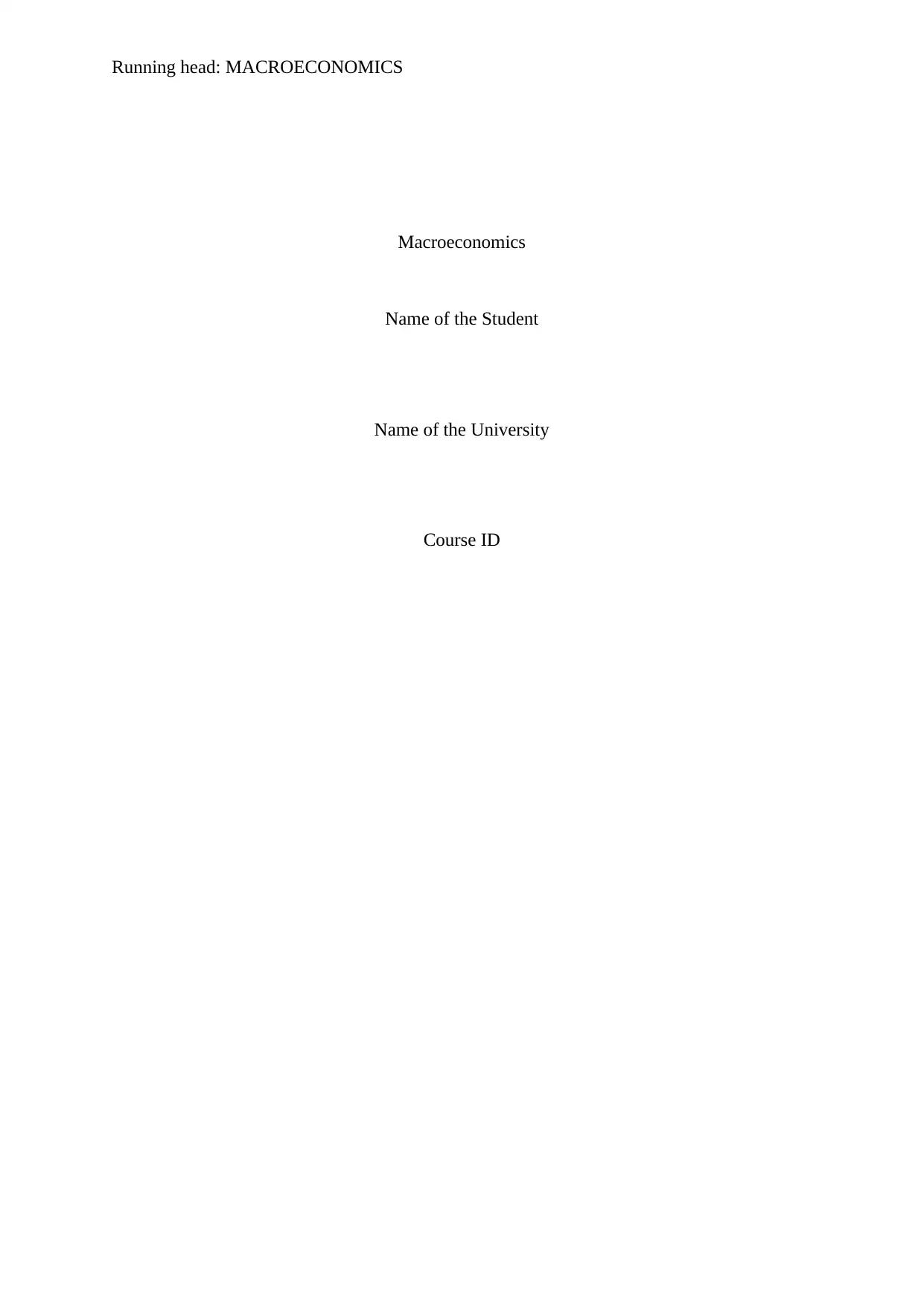
Running head: MACROECONOMICS
Macroeconomics
Name of the Student
Name of the University
Course ID
Macroeconomics
Name of the Student
Name of the University
Course ID
Paraphrase This Document
Need a fresh take? Get an instant paraphrase of this document with our AI Paraphraser
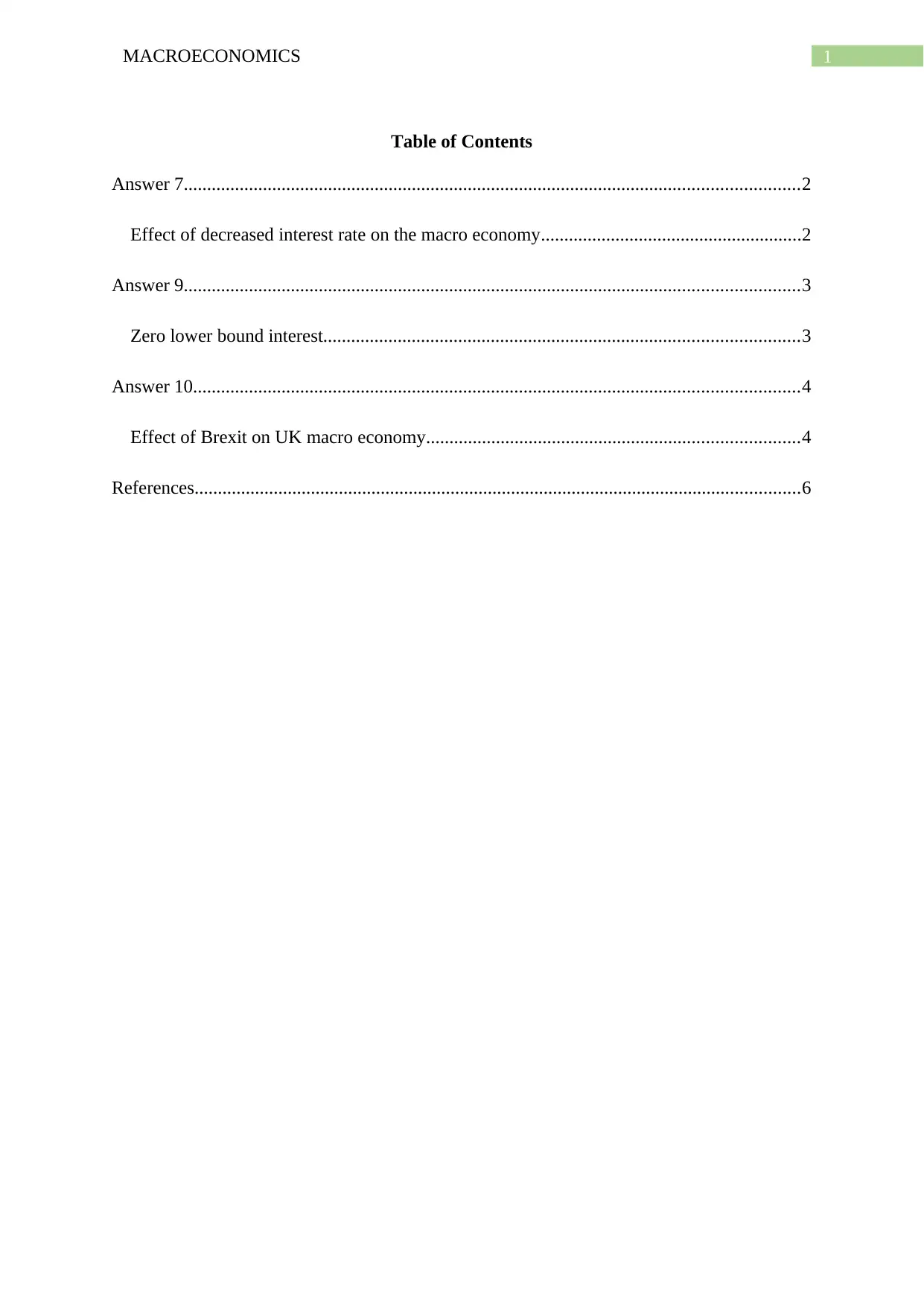
1MACROECONOMICS
Table of Contents
Answer 7....................................................................................................................................2
Effect of decreased interest rate on the macro economy........................................................2
Answer 9....................................................................................................................................3
Zero lower bound interest......................................................................................................3
Answer 10..................................................................................................................................4
Effect of Brexit on UK macro economy................................................................................4
References..................................................................................................................................6
Table of Contents
Answer 7....................................................................................................................................2
Effect of decreased interest rate on the macro economy........................................................2
Answer 9....................................................................................................................................3
Zero lower bound interest......................................................................................................3
Answer 10..................................................................................................................................4
Effect of Brexit on UK macro economy................................................................................4
References..................................................................................................................................6
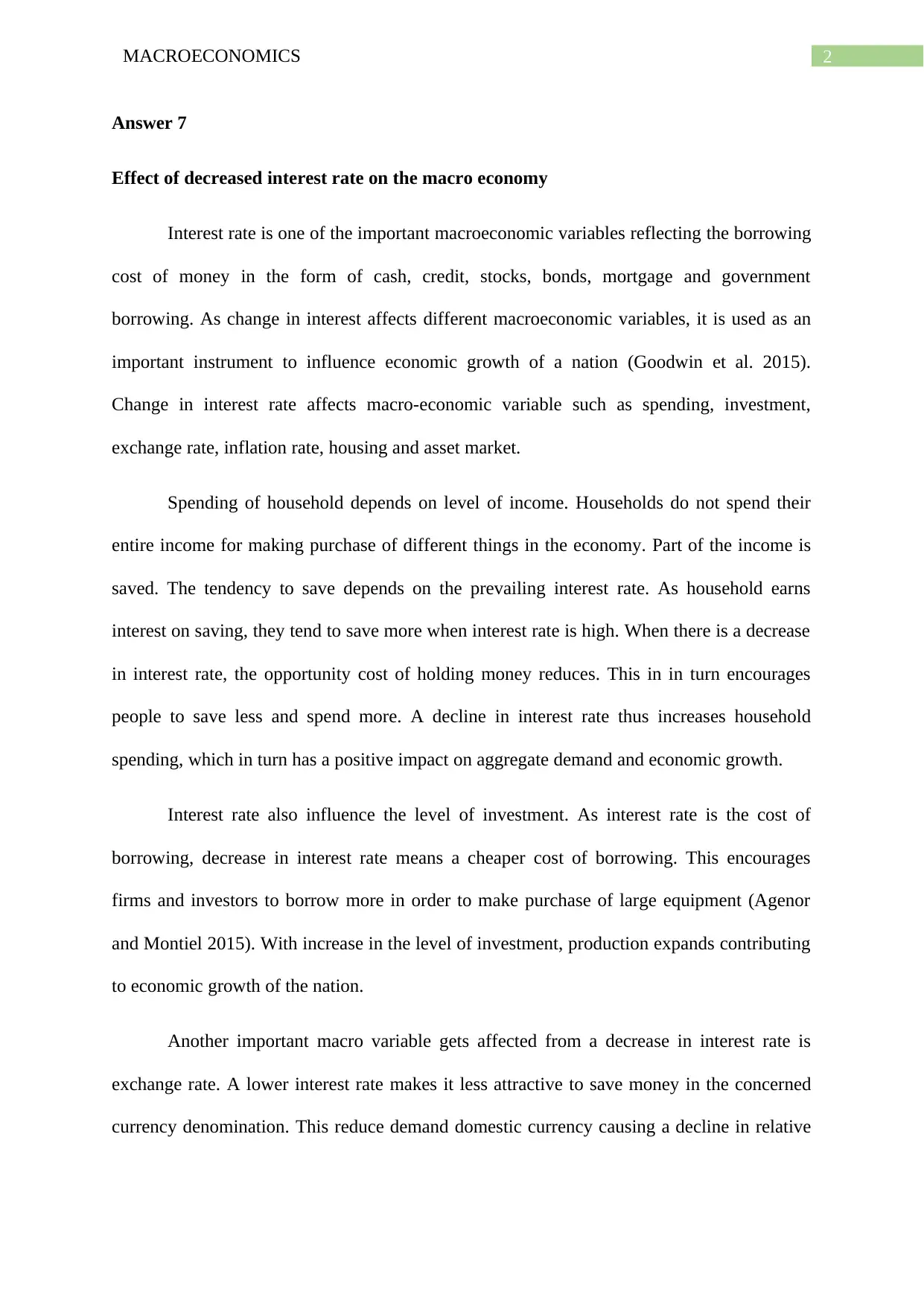
2MACROECONOMICS
Answer 7
Effect of decreased interest rate on the macro economy
Interest rate is one of the important macroeconomic variables reflecting the borrowing
cost of money in the form of cash, credit, stocks, bonds, mortgage and government
borrowing. As change in interest affects different macroeconomic variables, it is used as an
important instrument to influence economic growth of a nation (Goodwin et al. 2015).
Change in interest rate affects macro-economic variable such as spending, investment,
exchange rate, inflation rate, housing and asset market.
Spending of household depends on level of income. Households do not spend their
entire income for making purchase of different things in the economy. Part of the income is
saved. The tendency to save depends on the prevailing interest rate. As household earns
interest on saving, they tend to save more when interest rate is high. When there is a decrease
in interest rate, the opportunity cost of holding money reduces. This in in turn encourages
people to save less and spend more. A decline in interest rate thus increases household
spending, which in turn has a positive impact on aggregate demand and economic growth.
Interest rate also influence the level of investment. As interest rate is the cost of
borrowing, decrease in interest rate means a cheaper cost of borrowing. This encourages
firms and investors to borrow more in order to make purchase of large equipment (Agenor
and Montiel 2015). With increase in the level of investment, production expands contributing
to economic growth of the nation.
Another important macro variable gets affected from a decrease in interest rate is
exchange rate. A lower interest rate makes it less attractive to save money in the concerned
currency denomination. This reduce demand domestic currency causing a decline in relative
Answer 7
Effect of decreased interest rate on the macro economy
Interest rate is one of the important macroeconomic variables reflecting the borrowing
cost of money in the form of cash, credit, stocks, bonds, mortgage and government
borrowing. As change in interest affects different macroeconomic variables, it is used as an
important instrument to influence economic growth of a nation (Goodwin et al. 2015).
Change in interest rate affects macro-economic variable such as spending, investment,
exchange rate, inflation rate, housing and asset market.
Spending of household depends on level of income. Households do not spend their
entire income for making purchase of different things in the economy. Part of the income is
saved. The tendency to save depends on the prevailing interest rate. As household earns
interest on saving, they tend to save more when interest rate is high. When there is a decrease
in interest rate, the opportunity cost of holding money reduces. This in in turn encourages
people to save less and spend more. A decline in interest rate thus increases household
spending, which in turn has a positive impact on aggregate demand and economic growth.
Interest rate also influence the level of investment. As interest rate is the cost of
borrowing, decrease in interest rate means a cheaper cost of borrowing. This encourages
firms and investors to borrow more in order to make purchase of large equipment (Agenor
and Montiel 2015). With increase in the level of investment, production expands contributing
to economic growth of the nation.
Another important macro variable gets affected from a decrease in interest rate is
exchange rate. A lower interest rate makes it less attractive to save money in the concerned
currency denomination. This reduce demand domestic currency causing a decline in relative
⊘ This is a preview!⊘
Do you want full access?
Subscribe today to unlock all pages.

Trusted by 1+ million students worldwide
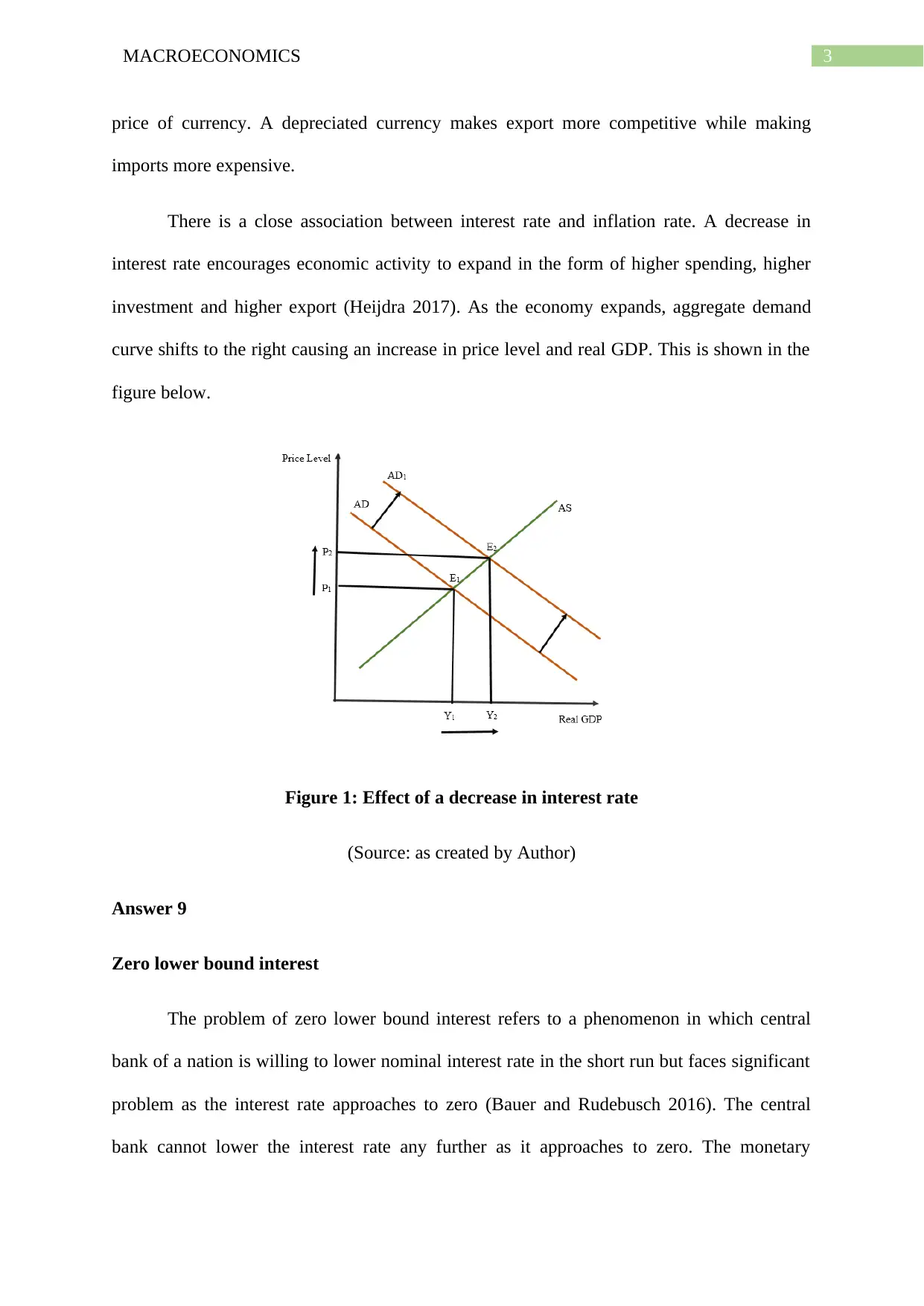
3MACROECONOMICS
price of currency. A depreciated currency makes export more competitive while making
imports more expensive.
There is a close association between interest rate and inflation rate. A decrease in
interest rate encourages economic activity to expand in the form of higher spending, higher
investment and higher export (Heijdra 2017). As the economy expands, aggregate demand
curve shifts to the right causing an increase in price level and real GDP. This is shown in the
figure below.
Figure 1: Effect of a decrease in interest rate
(Source: as created by Author)
Answer 9
Zero lower bound interest
The problem of zero lower bound interest refers to a phenomenon in which central
bank of a nation is willing to lower nominal interest rate in the short run but faces significant
problem as the interest rate approaches to zero (Bauer and Rudebusch 2016). The central
bank cannot lower the interest rate any further as it approaches to zero. The monetary
price of currency. A depreciated currency makes export more competitive while making
imports more expensive.
There is a close association between interest rate and inflation rate. A decrease in
interest rate encourages economic activity to expand in the form of higher spending, higher
investment and higher export (Heijdra 2017). As the economy expands, aggregate demand
curve shifts to the right causing an increase in price level and real GDP. This is shown in the
figure below.
Figure 1: Effect of a decrease in interest rate
(Source: as created by Author)
Answer 9
Zero lower bound interest
The problem of zero lower bound interest refers to a phenomenon in which central
bank of a nation is willing to lower nominal interest rate in the short run but faces significant
problem as the interest rate approaches to zero (Bauer and Rudebusch 2016). The central
bank cannot lower the interest rate any further as it approaches to zero. The monetary
Paraphrase This Document
Need a fresh take? Get an instant paraphrase of this document with our AI Paraphraser
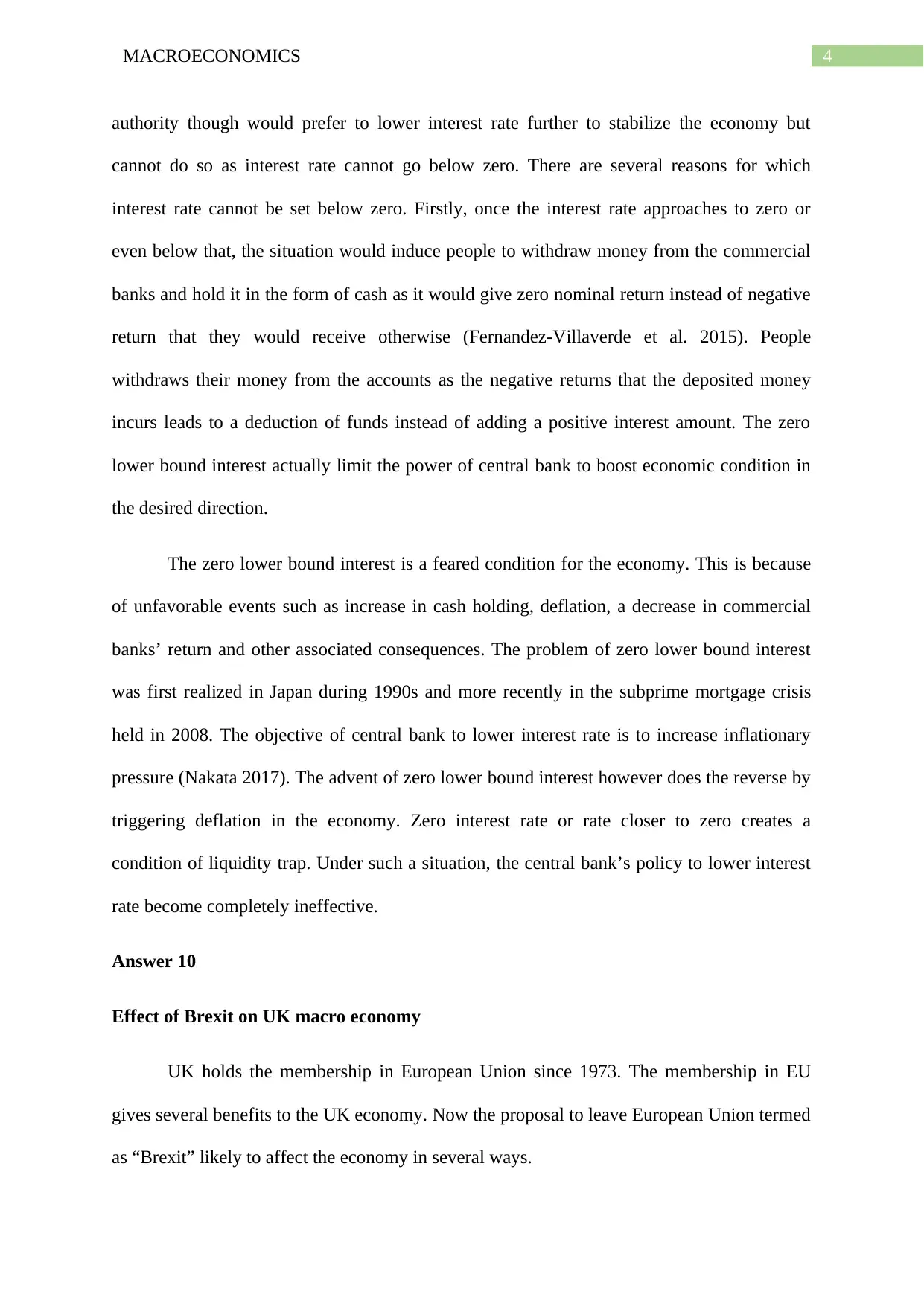
4MACROECONOMICS
authority though would prefer to lower interest rate further to stabilize the economy but
cannot do so as interest rate cannot go below zero. There are several reasons for which
interest rate cannot be set below zero. Firstly, once the interest rate approaches to zero or
even below that, the situation would induce people to withdraw money from the commercial
banks and hold it in the form of cash as it would give zero nominal return instead of negative
return that they would receive otherwise (Fernandez-Villaverde et al. 2015). People
withdraws their money from the accounts as the negative returns that the deposited money
incurs leads to a deduction of funds instead of adding a positive interest amount. The zero
lower bound interest actually limit the power of central bank to boost economic condition in
the desired direction.
The zero lower bound interest is a feared condition for the economy. This is because
of unfavorable events such as increase in cash holding, deflation, a decrease in commercial
banks’ return and other associated consequences. The problem of zero lower bound interest
was first realized in Japan during 1990s and more recently in the subprime mortgage crisis
held in 2008. The objective of central bank to lower interest rate is to increase inflationary
pressure (Nakata 2017). The advent of zero lower bound interest however does the reverse by
triggering deflation in the economy. Zero interest rate or rate closer to zero creates a
condition of liquidity trap. Under such a situation, the central bank’s policy to lower interest
rate become completely ineffective.
Answer 10
Effect of Brexit on UK macro economy
UK holds the membership in European Union since 1973. The membership in EU
gives several benefits to the UK economy. Now the proposal to leave European Union termed
as “Brexit” likely to affect the economy in several ways.
authority though would prefer to lower interest rate further to stabilize the economy but
cannot do so as interest rate cannot go below zero. There are several reasons for which
interest rate cannot be set below zero. Firstly, once the interest rate approaches to zero or
even below that, the situation would induce people to withdraw money from the commercial
banks and hold it in the form of cash as it would give zero nominal return instead of negative
return that they would receive otherwise (Fernandez-Villaverde et al. 2015). People
withdraws their money from the accounts as the negative returns that the deposited money
incurs leads to a deduction of funds instead of adding a positive interest amount. The zero
lower bound interest actually limit the power of central bank to boost economic condition in
the desired direction.
The zero lower bound interest is a feared condition for the economy. This is because
of unfavorable events such as increase in cash holding, deflation, a decrease in commercial
banks’ return and other associated consequences. The problem of zero lower bound interest
was first realized in Japan during 1990s and more recently in the subprime mortgage crisis
held in 2008. The objective of central bank to lower interest rate is to increase inflationary
pressure (Nakata 2017). The advent of zero lower bound interest however does the reverse by
triggering deflation in the economy. Zero interest rate or rate closer to zero creates a
condition of liquidity trap. Under such a situation, the central bank’s policy to lower interest
rate become completely ineffective.
Answer 10
Effect of Brexit on UK macro economy
UK holds the membership in European Union since 1973. The membership in EU
gives several benefits to the UK economy. Now the proposal to leave European Union termed
as “Brexit” likely to affect the economy in several ways.
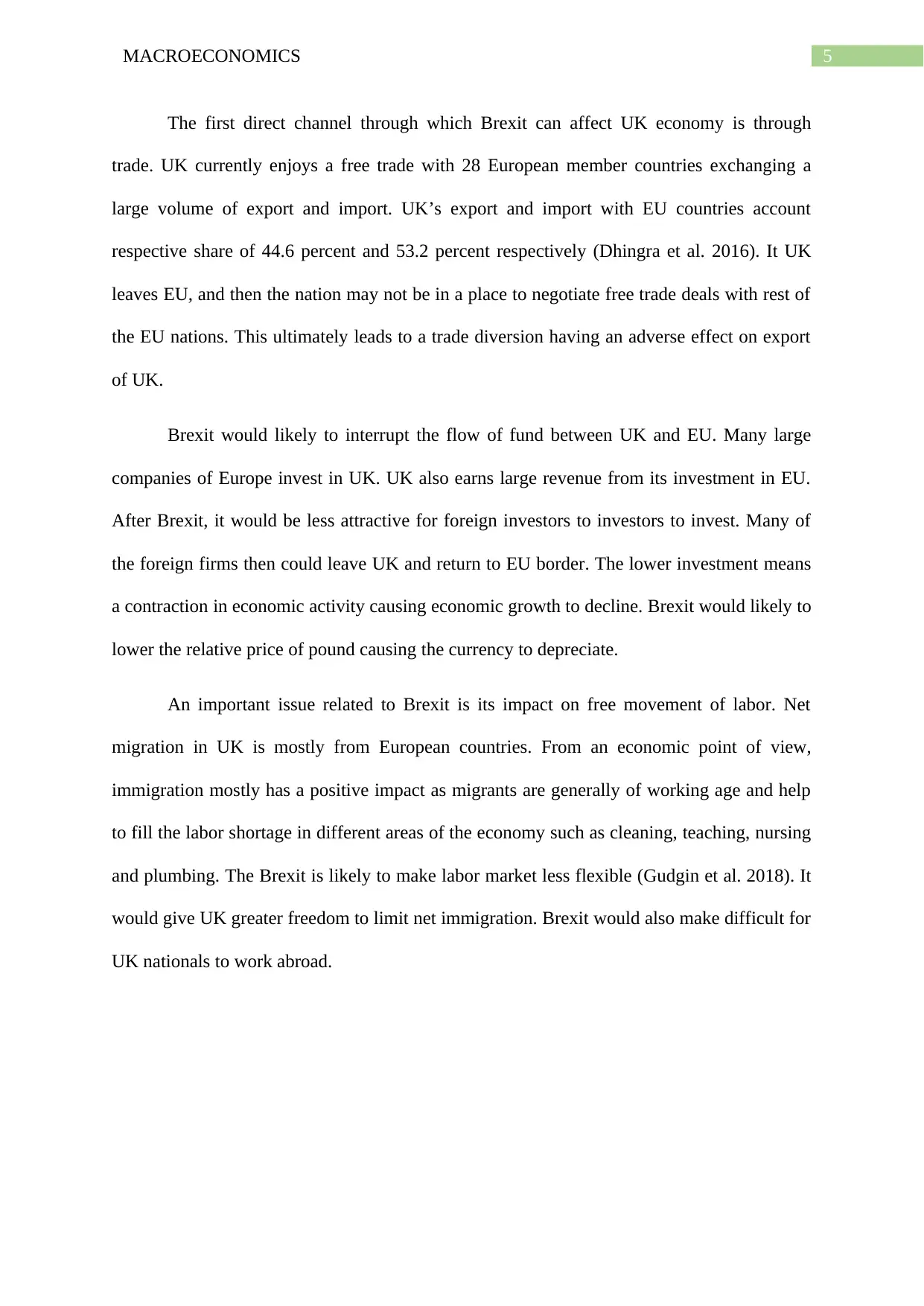
5MACROECONOMICS
The first direct channel through which Brexit can affect UK economy is through
trade. UK currently enjoys a free trade with 28 European member countries exchanging a
large volume of export and import. UK’s export and import with EU countries account
respective share of 44.6 percent and 53.2 percent respectively (Dhingra et al. 2016). It UK
leaves EU, and then the nation may not be in a place to negotiate free trade deals with rest of
the EU nations. This ultimately leads to a trade diversion having an adverse effect on export
of UK.
Brexit would likely to interrupt the flow of fund between UK and EU. Many large
companies of Europe invest in UK. UK also earns large revenue from its investment in EU.
After Brexit, it would be less attractive for foreign investors to investors to invest. Many of
the foreign firms then could leave UK and return to EU border. The lower investment means
a contraction in economic activity causing economic growth to decline. Brexit would likely to
lower the relative price of pound causing the currency to depreciate.
An important issue related to Brexit is its impact on free movement of labor. Net
migration in UK is mostly from European countries. From an economic point of view,
immigration mostly has a positive impact as migrants are generally of working age and help
to fill the labor shortage in different areas of the economy such as cleaning, teaching, nursing
and plumbing. The Brexit is likely to make labor market less flexible (Gudgin et al. 2018). It
would give UK greater freedom to limit net immigration. Brexit would also make difficult for
UK nationals to work abroad.
The first direct channel through which Brexit can affect UK economy is through
trade. UK currently enjoys a free trade with 28 European member countries exchanging a
large volume of export and import. UK’s export and import with EU countries account
respective share of 44.6 percent and 53.2 percent respectively (Dhingra et al. 2016). It UK
leaves EU, and then the nation may not be in a place to negotiate free trade deals with rest of
the EU nations. This ultimately leads to a trade diversion having an adverse effect on export
of UK.
Brexit would likely to interrupt the flow of fund between UK and EU. Many large
companies of Europe invest in UK. UK also earns large revenue from its investment in EU.
After Brexit, it would be less attractive for foreign investors to investors to invest. Many of
the foreign firms then could leave UK and return to EU border. The lower investment means
a contraction in economic activity causing economic growth to decline. Brexit would likely to
lower the relative price of pound causing the currency to depreciate.
An important issue related to Brexit is its impact on free movement of labor. Net
migration in UK is mostly from European countries. From an economic point of view,
immigration mostly has a positive impact as migrants are generally of working age and help
to fill the labor shortage in different areas of the economy such as cleaning, teaching, nursing
and plumbing. The Brexit is likely to make labor market less flexible (Gudgin et al. 2018). It
would give UK greater freedom to limit net immigration. Brexit would also make difficult for
UK nationals to work abroad.
⊘ This is a preview!⊘
Do you want full access?
Subscribe today to unlock all pages.

Trusted by 1+ million students worldwide
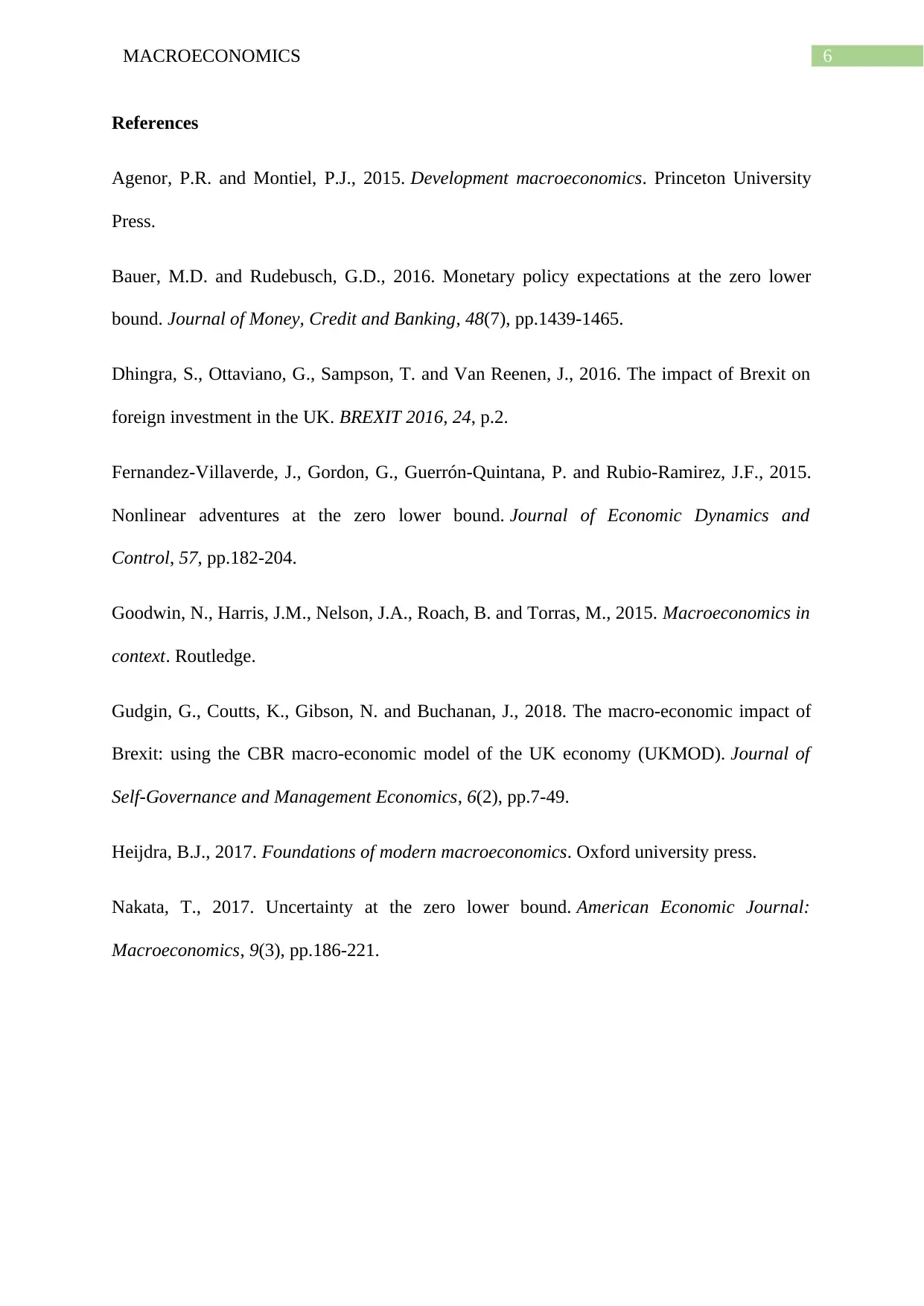
6MACROECONOMICS
References
Agenor, P.R. and Montiel, P.J., 2015. Development macroeconomics. Princeton University
Press.
Bauer, M.D. and Rudebusch, G.D., 2016. Monetary policy expectations at the zero lower
bound. Journal of Money, Credit and Banking, 48(7), pp.1439-1465.
Dhingra, S., Ottaviano, G., Sampson, T. and Van Reenen, J., 2016. The impact of Brexit on
foreign investment in the UK. BREXIT 2016, 24, p.2.
Fernandez-Villaverde, J., Gordon, G., Guerrón-Quintana, P. and Rubio-Ramirez, J.F., 2015.
Nonlinear adventures at the zero lower bound. Journal of Economic Dynamics and
Control, 57, pp.182-204.
Goodwin, N., Harris, J.M., Nelson, J.A., Roach, B. and Torras, M., 2015. Macroeconomics in
context. Routledge.
Gudgin, G., Coutts, K., Gibson, N. and Buchanan, J., 2018. The macro-economic impact of
Brexit: using the CBR macro-economic model of the UK economy (UKMOD). Journal of
Self-Governance and Management Economics, 6(2), pp.7-49.
Heijdra, B.J., 2017. Foundations of modern macroeconomics. Oxford university press.
Nakata, T., 2017. Uncertainty at the zero lower bound. American Economic Journal:
Macroeconomics, 9(3), pp.186-221.
References
Agenor, P.R. and Montiel, P.J., 2015. Development macroeconomics. Princeton University
Press.
Bauer, M.D. and Rudebusch, G.D., 2016. Monetary policy expectations at the zero lower
bound. Journal of Money, Credit and Banking, 48(7), pp.1439-1465.
Dhingra, S., Ottaviano, G., Sampson, T. and Van Reenen, J., 2016. The impact of Brexit on
foreign investment in the UK. BREXIT 2016, 24, p.2.
Fernandez-Villaverde, J., Gordon, G., Guerrón-Quintana, P. and Rubio-Ramirez, J.F., 2015.
Nonlinear adventures at the zero lower bound. Journal of Economic Dynamics and
Control, 57, pp.182-204.
Goodwin, N., Harris, J.M., Nelson, J.A., Roach, B. and Torras, M., 2015. Macroeconomics in
context. Routledge.
Gudgin, G., Coutts, K., Gibson, N. and Buchanan, J., 2018. The macro-economic impact of
Brexit: using the CBR macro-economic model of the UK economy (UKMOD). Journal of
Self-Governance and Management Economics, 6(2), pp.7-49.
Heijdra, B.J., 2017. Foundations of modern macroeconomics. Oxford university press.
Nakata, T., 2017. Uncertainty at the zero lower bound. American Economic Journal:
Macroeconomics, 9(3), pp.186-221.
1 out of 7
Related Documents
Your All-in-One AI-Powered Toolkit for Academic Success.
+13062052269
info@desklib.com
Available 24*7 on WhatsApp / Email
![[object Object]](/_next/static/media/star-bottom.7253800d.svg)
Unlock your academic potential
Copyright © 2020–2026 A2Z Services. All Rights Reserved. Developed and managed by ZUCOL.



